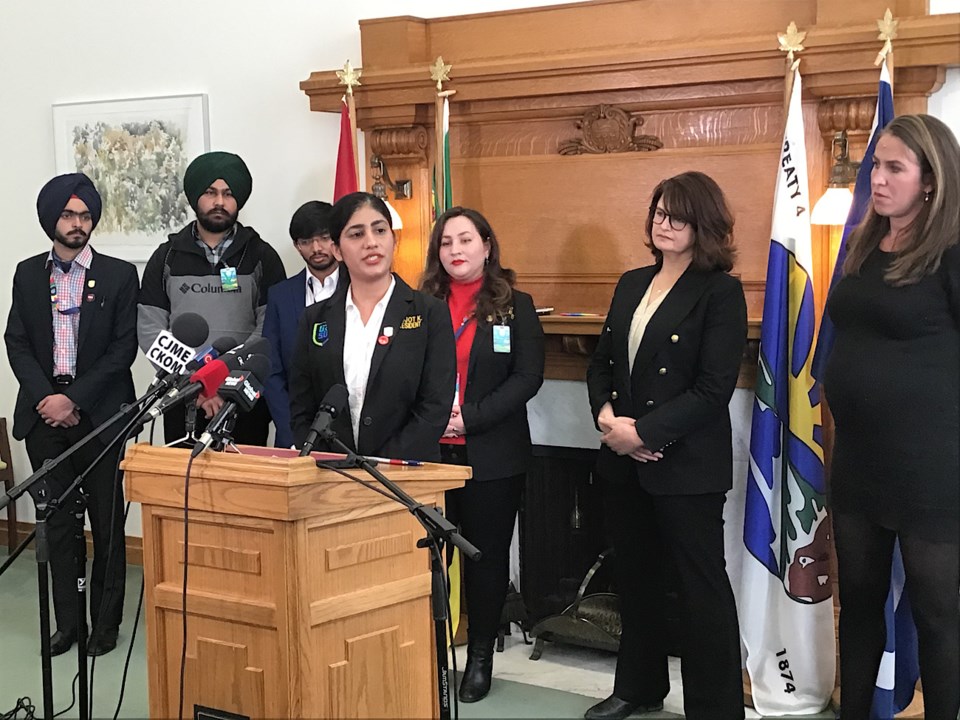REGINA - The opposition New Democrats were once again on the attack this week, calling on the Scott Moe government to address, immigrant retention rates.
Opposition Leader Carla Beck and Immigration, and Economy Critic Aleana Young were joined at the legislature Thursday afternoon by a group of international students from the University of Regina.
At that media conference the NDP accused the government of the worst immigrant retention rates in the nation outside of Atlantic Canada. The students who joined Beck and Young also pointed to a lack of jobs, and to issues in health care and other areas.
The Opposition MLAs pointed to StatsCan numbers on provinces' ability to retain immigrants over a five year period. In characterizing the Saskatchewan numbers, Beck said new families and immigrant workers, doctors and tradespeople were leaving the province “like it’s the last flight out.”
She aaid that since 2015, Saskatchewan has had the worst rates of immigrant retention among the provinces outside of Atlantic Canada. The NDP cited numbers from 2015-20 that showed Saskatchewan’s five-year retention rate stood at 63 per cent, behind Ontario, Quebec and the three other Western provinces. They also cited numbers since 2010, showing Saskatchewan falling from a retention rate high of 78 percent in 2011-16.
“Today we’re calling on Scott Moe and the Sask Party government to get back to work,” said Beck. “To commit to creating a real plan that attracts and retains new families and economic immigrants."
In her remarks Young called on the Moe government to commit to creating a plan to attract and retain immigrants, to include English as an additional language supports in schools, to improve credentialing, access to housing, increased financial support for organizations that help immigrants, and expansion of opportunity for capital and start-up incentives.
“We need to make Saskatchewan competitive with other provinces, and the solutions are out there if this government would actually start listening to people,” said Young.
The university students with Beck and Young on Thursday were blunt about the situation they faced.
Navjot Kaur, President of the University of Regina Students Union, pointed to a lack of jobs for graduates in the province. She was studying for a masters in chemistry, but noted when she looked on LinkedIn for jobs that most of the professional opportunities in her field were in Ontario, Quebec or British Columbia.
“I really expect to get a good job,” said Kaur, but said “my expectations are going low.” She said when she came to Canada she worked in McDonalds, and said she was surrounded by coworkers who had done master’s in computer science, chemistry and education. When she asked them what they had put in their resume, she said they responded they had to hide their credentials in case they were considered overqualified.
The main reason she had left her country to come to Canada was a lack of job security. “This is a problem here as well,” said Kaur. “And I don’t want to live with this my whole life.”
Another, Birpartap Singh, is studying at University of Regina as an international student.
He pointed to an experience taking her grandmother to the hospital, where they waited 30 hours to see a doctor and she was then prescribed medication.
“Is health care only important when it’s an emergency?” said Singh. He also wanted to know what the government was doing to keep doctors from leaving, and was of the opinion they were “paid higher in other provinces.”
In general the students expressed their desire to stay in Saskatchewan but voiced frustration over the struggles they were having in staying. Young said their main call that day was to address retention and keep the people already here, “with pathways to permanent residency and citizenship. It’s not hard, it’s not reinventing the wheel.”
“They have ideas. They have real life experience about the reasons they would like to stay in this province and experience in watching friends and family leave,” said Beck of the students. “What we’re hearing too many times is that we have a government that isn’t even asking the questions, let alone coming up with a plan to address what is a critical lack of retention right now in the province.”
Government response
Minister of Immigration and Career Training Jeremy Harrison has responded with the following statement:
“The fact is that Saskatchewan's population is growing at its fastest pace in over 100 years with this record population increase largely due to immigration. Since 2007 79 per cent of all population growth is due to net international migration. In fact, SK grew by more than 10,000 people in the last quarter of 2022. The largest quarterly population increase since Stats Can started releasing population estimates in 1971. That's more growth in the last three months than in 16 years under the NDP. The NDP have a long history of cherry picking outdated data with the intention of running down Saskatchewan's accomplishments for their own narrow partisan purposes.
“Further, Saskatchewan retains the vast majority of those who immigrate here. Those people stay because of an economy that has grown tremendously and has provided life changing opportunities for newcomers to make a living and raise a family. This is a stark contrast to the NDP years when the economy shrunk and the population actually declined. It's also important to remember that there was virtually no international immigration to Saskatchewan during the NDP years. As the Government of Saskatchewan, we will stay focused on growing our province.”
The SaskParty also noted that in 2022, Saskatchewan’s employment rate for very recent immigrants landed in the most recent five years between ages 25 to 54, was 74.2 per cent, above the national average of 71.5 per cent and the fifth highest among all provinces.






